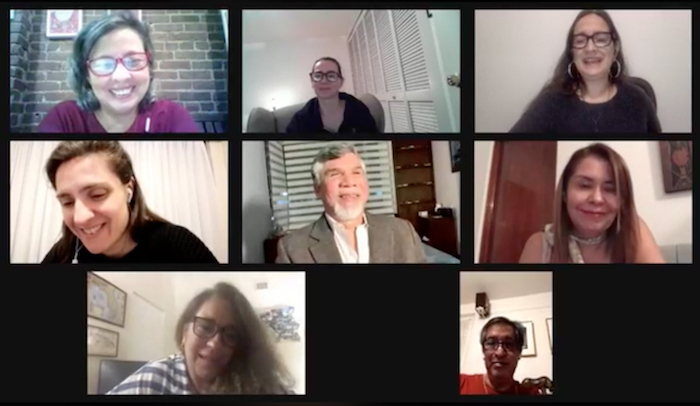Round Table Discussion “The Blind Spot of Cinema” - Accessibility to Audiovisual Media for the blind in Latin America
On September 22nd, we participated in the discussion organized by El Gremio Latam: The blind spot of cinema - The blind go to the cinema and watch TV. This discussion was a great meeting space with other colleagues from Latin America who work in audiovisual media accessibility.

The participants in the discussion were:
Panelists
- María Victoria Diaz (Dicapta. Colombia - United States). She is Dicapta’s CEO and has 20 years of experience in providing accessibility services, including captions and video descriptions.
- Orissa Castellanos (Channel 22. Mexico). She has been director of film distribution and promotion and is currently Executive Director of Channel 22.
- Florencia Fascioli (Uruguay). She directs the Audiovisual Accessibility Program at the Universidad Católica del Uruguay. Florencia is a teacher of description.
- Dean Lermen (Colombia). He is a university professor, and a consultant in public policy, communications, audio description and disability. Additionally, Dean is Secretary of Human Rights of the Latin American Union of the Blind.
- Carol Colmenares (Timeline Digital. Colombia - United States). She is an audiovisual producer and has worked in the field of accessibility for 15 years.
- Marco Antonio Cruz (Mexico). Photographer. His book, "Dwelling in the dark," includes a 16-year-old work that presents the world of the blind and the photographer's gaze on the daily life of blind individuals.
Moderators
- Claudia Gonzales Munive (Mexico). El Gremio Latam Director.
- Belen Orsini (Venezuela). Cinematographic Director.
The discussion started around the very definition of accessibility. It gathered opinions as diverse as it is a bridge that takes me from one place to another, it is a right, it is an obligation, and it is the possibility of a meeting.
Then, it focused on explaining what description is, how the descriptor works, where it can be learned, and the importance of a balance between the description of an audiovisual production and other elements, such as silences and the soundtrack.
Marco Antonio Cruz enriched the discussion by sharing his photographic experience with people who are blind and commented that, in Mexico, social inequality and forgetfulness have a great impact on blindness. He mentioned trachoma, a disease that if left untreated can cause blindness and that affects indigenous communities in Chiapas.
There is work to be done in many areas, and a great impact would be achieved if the film and audiovisual schools educate students about the importance of accessibility. The objective is that, in the future, accessibility becomes part of audiovisual productions from the beginning rather than an element that is added after the production has been made.
Javier Olarte, an attendee to the discussion, invited to seek a synergy with Cilect, which is a global organization that brings together 188 film schools from around the world.
The Gremio Latam is an organization that groups together the workers of the Film and Audiovisual Industry of Latin America. We thank El Gremio Latam for its invitation to this discussion. Spaces like this help generate greater awareness in Latin America about the need to offer equal access to audiovisual media to blind audiences.
